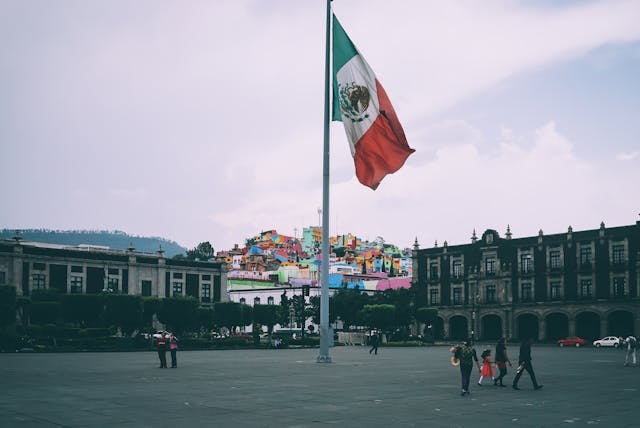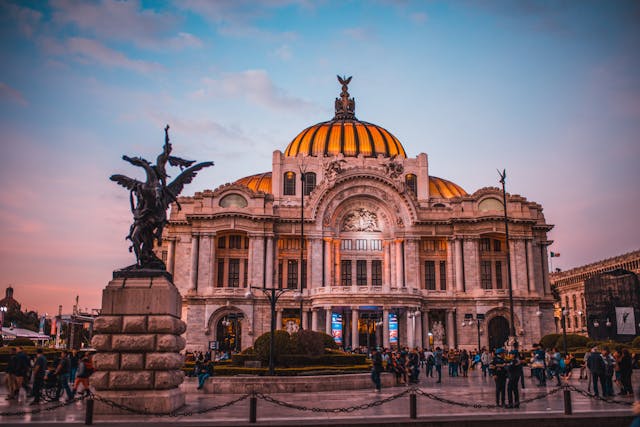Mexican Slang for Travellers: Your Definitive Guide
If you’ve studied Spanish in Spain, arriving in Mexico might leave you feeling a bit puzzled. Mexican Spanish is rich with slang and unique expressions that can make everyday conversations a bit challenging to follow. Mexican slang terms and phrases are deeply embedded in the culture and can vary significantly from the standard Spanish you may have learned.
In this blog, we’ll explore some of the most common and colourful Mexican slang expressions. By familiarising yourself with these terms, you’ll not only improve your comprehension but also sound more like a local when you travel to Mexico!
Table of Contents
- Basic Mexican Slang Words and Phrases
- Mexican Slang for People (Nouns)
- Cafre (Terrible Driver)
- Carnal (Close Friend)
- Chairo (Social Justice Warrior)
- Chavo/Chava (Kid)
- Chilango (Person from Mexico City)
- Chicano (Mexican-American)
- Cholo (Mexican Hip-Hop Kid)
- Cuate (Friend)
- Derechairo (Right-Wing Person)
- Fresa (Stuck-Up Person)
- Malinchista (Traitor)
- Mandilón (Whipped)
- Metiche (Busybody)
- Naco (Low-Class Person)
- Ñoño (Nerd)
- Paisa (Countryman)
- Ruco (Old Person)
- Wey (Dude)
- Mexican Slang for People (Adjectives)
→Sign Up Now: Free Trial Spanish Lesson With a Native Teacher!←
Basic Mexican Slang Words and Phrases
¡Aguas! (Careful!)
While “agua” means water, in Mexican slang, “¡aguas!” is a warning to be careful or to look out.
¡Aguas con los perros! — Careful with the dogs!
¡Ahorita! (Soon)
“Ahorita” literally translates to “little now,” but it often means “soon” or “eventually” in Mexican slang. Despite being told it means “right now,” it can imply a wide range of times.
¿Puedes ayudarme con mi tarea? Ahorita. — Can you help me with my homework? Soon.
¿Ya nos vamos? Ahorita. — Let’s go now? Soon.
¡Cámara! (I Agree)
“Cámara” can mean a camera, but as a Mexican slang expression, it signifies agreement or a deal. A stronger version of this is “conste.”
Cámara, nos vemos a las ocho. — Alright, see you at eight.
¡Chido! (Cool)
“Chido” means cool and is typically used for objects and situations, whereas for people, it’s more common to say “buena onda.”
Ese concierto estuvo chido. — That concert was cool.
Luego Luego (Right Now)
While “luego” means “later,” “luego luego” actually means “right now.”
Termínalo luego luego. — Finish it right now.
¿Mande? (What?)
“Mande” is a polite way to ask “What?” when you don’t understand something. It can also mean “Tell me” or “Go ahead,” encouraging someone to speak, often used on the telephone.
¿Mande? No escuché bien. — What? I didn’t hear well.
¡Ni Modo! (It Doesn’t Matter)
“Ni modo” translates to “no method” but is commonly used in Mexican slang to mean “it doesn’t matter,” “it can’t be helped,” or a dismissive “whatever.”
Se nos olvidó el pan, ni modo. — We forgot the bread, oh well.
¡No Hay Bronca! (No Problem)
This phrase means “no problem” and is an alternative to the vulgar “No hay pedo.”
Tranquilo, no hay bronca. — Don’t worry, it’s no problem.

¡No Manches! (No Way!)
Instead of asking “¿apoco?” (Really?), you can react to surprising information by saying “¡No manches!” which means “No way!” or “Come on!” The literal translation is “Don’t stain,” a euphemism for the vulgar “no mames.”
¿Te ganaste la lotería? ¡No manches! — You won the lottery? No way!
¿Neta? (Really?)
“Neta” is a highly informal way of asking “Really?” or “For real?” It can also mean that something is the best.
¿Neta te vas a ir a vivir a Japón? — Really, you’re moving to Japan?
¡Órale! (Right On!)
“¡Órale!” can be used for encouragement like “Go for it!” or “Right on!” It can also mean “Let’s do it!” or “Let’s go!” and express excitement like “Wow!” or “My goodness!”
¡Órale, vámonos ya! — Alright, let’s go now!
¡Pinche! (Damn)
“Pinche” is not quite vulgar but translates to “damn” when used to describe something or someone.
¡Pinche coche! — Damn car!
¡Qué Milagro! (Long Time No See)
Literally “What a miracle!”, this phrase is used to say “Long time no see.”
¡Qué milagro verte por aquí! — Long time no see you around here!
¡Qué Onda! (What’s Up?)
This is another way to say “What’s up?” A more informal Mexican slang version is “¿Qué tranza?”, or the vulgar “¿Qué pedo?” “Onda” translates to “wave” (as in sound or light waves, not ocean waves).
Ella es buena onda. — She’s cool.
¿Agarraste la onda? — Do you get my drift?
Mexican Slang for People (Nouns)
Cafre (Terrible Driver)
A “cafre” is someone who drives recklessly. They often drive a “carcacha,” which is a beat-up car. Another word for something broken down is “cacharro.”
Maneja como un cafre. — He drives like a maniac.
Carnal (Close Friend)
“Carnal” is a Mexican slang for “homie”. People use it to describe a very close friend, often akin to a brother.
Él es mi carnal, lo conozco desde siempre. — He’s my close friend, I’ve known him forever.
Chairo (Social Justice Warrior)
A “chairo” is someone with left-leaning political views who advocates for a socialist utopia. This term is used insultingly.
Ese chairo siempre está hablando de justicia social. — That social justice warrior is always talking about social justice.
Chavo/Chava (Kid)
“Chavo” and “chava” are common slang terms for kids or young people. Other similar terms include “chamaco/chamaca” and “morro/morra.”
Mi chava está en la universidad. — My girl is in college.
Chilango (Person from Mexico City)
A “chilango” is someone from Mexico City. This term can refer to anyone living in this large metropolis.
Los chilangos siempre hablan rápido. — People from Mexico City always talk fast.
Chicano (Mexican-American)
“Chicano” refers to Mexicans living in the United States, or Mexican-Americans.
Los chicanos celebran tanto el 5 de mayo como el 4 de julio. — Mexican-Americans celebrate both May 5th and July 4th.
Cholo (Mexican Hip-Hop Kid)
A “cholo” is a Mexican hip-hop enthusiast who wears big pants, big chains, and distinct Mexican slang.
Los cholos en mi barrio siempre escuchan rap. — The hip-hop kids in my neighbourhood always listen to rap.
Cuate (Friend)
“Cuate” is another Mexican slang term for a close friend, often one who is like a brother. It can also mean fraternal twin.
Mi cuate siempre está conmigo en las buenas y en las malas. — My friend is always with me through thick and thin.
Derechairo (Right-Wing Person)
“Derechairo” (from “derecha”, meaning right) is a derogatory Mexican slang term for someone with right-wing political views. Another similar term is “mocho,” especially for those who are overly religious.
Los derechairos y los chairos siempre discuten. — Right-wing and left-wing people always argue.
Fresa (Stuck-Up Person)
“Fresa” literally means strawberry but is used to describe someone who is picky or stuck-up. This Mexican slang term also describes things that are cheesy or lightweight.
Ella es muy fresa, siempre se queja de todo. — She’s very stuck-up, always complaining about everything.
Malinchista (Traitor)
A “malinchista” is a Mexican who prefers foreign things and is seen as betraying their culture. This term comes from Malinche, the indigenous translator for Hernan Cortés.
Él es un malinchista, siempre habla de su viaje a Europa. — He’s a traitor, always talking about his trip to Europe.
Mandilón (Whipped)
In Mexican slang, a “mandilón” is a man whose wife or girlfriend is always bossing him around. The English equivalent, though more vulgar, is “pussy-whipped.”
Todos dicen que Juan es un mandilón porque siempre obedece a su esposa. — Everyone says Juan is whipped because he always obeys his wife.

Metiche (Busybody)
A “metiche” (from the verb “meterse”, to meddle) is someone who is too interested in other people’s business. If they are also a gossip, they are called “chismoso.”
Ese vecino es un metiche, siempre quiere saberlo todo. — That neighbour is a busybody, always wanting to know everything.
Naco (Low-Class Person)
A “naco” is considered low-class not due to economic status, but because of their behaviour and attitude. Similar to the American term “redneck.”
No seas naco, compórtate bien. — Don’t be low-class, behave well.
Ñoño (Nerd)
“Ñoño” means nerd or nerdy. In Spain, it can mean cheesy, but in Mexico, cheesy is “cursi.”
Ese chico es muy ñoño, siempre está estudiando. — That guy is a nerd, always studying.
Paisa (Countryman)
“Paisa” is short for “paisano” (peasant) and is used in Baja California to refer to someone from the same country. It is a non-vulgar term.
Somos paisas, venimos del mismo pueblo. — We’re countrymen, we come from the same town.
Ruco (Old Person)
A “ruco” is an old person. “Chavoruco” describes an old person who tries to act young. “Rabo verde” (green tail) is an old man chasing young women.
Ese ruco aún cree que tiene veinte años. — That old man still thinks he’s twenty.
Wey (Dude)
“Wey” (or “güey”) means dude. It can also mean dumbass or idiot when used angrily. In northern Mexico, people use “vato,” and “cabron” can be friendly or vulgar. “Compa” is a common abbreviation for “compadre,” used for close friends or relatives.
Simón wey, vamos a la fiesta wey. — Yeah dude, let’s go to the party dude.
Mexican Slang for People (Adjectives)
Buena (Hot)
Women with an attractive body are called “buena,” “bien buena,” or the more emphatic “buenota.” Be careful with this term as it can be taken the wrong way.
Estás bien buena, güera. — You are hot, white lady.
Cochino (Pig)
“Cochino” means pig, used metaphorically to describe someone who is dirty, disgusting, or rude. It can also be used as an adjective.
Tu casa está cochina. — Your house is dirty.
Codo (Stingy)
“Codo” means elbow, but in Mexican slang, it refers to a stingy person. It implies someone who doesn’t want to spend money.
No seas codo. — Don’t be cheap.
Güera (Light-Skinned Woman)
“Güera” (pronounced gwe-rah) is used to describe a light-skinned woman with blonde or light brown hair. For men, the term is “güero.”
Eres una güera muy bonita. — You are a very pretty blonde.
Jeta (Dirty Look)
“Jeta” refers to a dirty look or a sour expression on someone’s face. A woman with a “jeta” is called “jetona.”
Ella siempre tiene una jeta cuando está enojada. — She always has a dirty look when she’s angry.
Pelón (Bald Guy)
“Pelón” (from “pelado”, meaning hairless) is a common nickname for a bald guy, especially those who shave their heads.
Mi amigo es pelón y siempre usa gorra. — My friend is bald and always wears a cap.
Prieto (Dark-Skinned)
“Prieto” is a term people use to describe dark-skinned people. However, most people believe it’s racist or bigoted.
No deberías llamar a nadie prieto, es ofensivo. — You shouldn’t call anyone dark-skinned, it’s offensive.
Learning Mexican slang is a fantastic way to deepen your understanding of the language and culture. Whether you’re looking to sound more like a local or just want to have some fun with your Spanish, mastering these expressions will definitely enhance your language skills.
→Sign Up Now: Free Trial Spanish Lesson With a Native Teacher!←
If you’re eager to learn more, consider taking Spanish lessons with Listen & Learn. We offer convenient online courses, allowing you to study from the comfort of your home. For those who prefer face-to-face interactions, we also provide in-person lessons at your home, office, or a public space. We offer Spanish courses in Melbourne, Sydney, and every major city in Australia.
Contact Listen & Learn today and unlock the full potential of your Spanish-speaking abilities!


